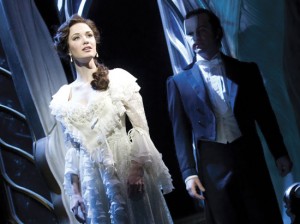 Love Never Dies (Universal, 2012)
Love Never Dies (Universal, 2012)
I keep bumping into Andrew Lloyd Webber. Once was inadvertent; he did the music (including, with lyricist Tim Rice, the Perry Como-sung “Christmas Dream”) for the 1974 film version of Frederick Forsyth’s thriller The Odessa File, which is now on Blu-ray. But, as a card-carrying member of New York’s Drama Desk, I was obliged to see the current Broadway revivals of Jesus Christ Superstar (quite good) and Evita (a screechy, didactic mess, though well staged; the 1996 movie is better). Forward momentum into Webberworld led to me to the much-derided Love Never Dies, a film of the sequel to Sir Andrew’s undying triumph, The Phantom of the Opera. Was it all I asked of it?
The Story: I saw Phantom at the start of its record-breaking Broadway run (10,000 performances and counting) in 1988, and a second time a few years back with my in-laws. Outside of a cheesy laser beam effect for the Phantom the songs and spectacle held up well, and other than the miscasting of Gerard Butler I really like the 2004 movie, in which Lloyd Webber and director Joel Schumacher’s shared penchant for overindulgence was appropriately indulged.
The movie wasn’t terribly succesful, and Lloyd Webber’s commercial fortunes have changed, too (well, other than all that Phantom dough, and Cats cash). He hasn’t had a sizable hit since Sunset Boulevard in the 90s (which wasn’t much of a blockbuster on Broadway) and his recent status as a reality show impresario in the UK was I suspect somewhat less than fully satisfying. (Though he does have a No. 1 single across the pond.) So, like Ridley Scott and his Alien-ish Prometheus, he went back to the well–and drew distinctly unsparkling water from Phantom.
After Love Never Dies flopped noisily on the West End last year, Lloyd Webber took it far from the madding crowd, to Melbourne’s Regent Theatre, where the direction and design were overhauled (again–he’s been tinkering with the concept since 1990). The show was originally based on Forsyth’s 1999 book sequel The Phantom of Manhattan (connections never die) but it has changed boroughs and is now set in Coney Island, where, a decade after the to-do at the Paris Opera House, the Phantom secretly runs the Phantasma, an amusement park conceived as a maze of catwalks and mirrored scenic elements. Looking after him is the loyal Madame Giry, who hopes that the Phantom will bestow his musical genius on her daughter Meg. The Phantom, however, only has ears for his ingenue Christine, for whom he still pines.
 Fate, and the gambling debts accrued by her husband Raoul (the dullest hero in the musical theatre canon, reconfigured as an ungrateful louse), bring Christine to New York, where in due course she and the Phantom renew their off-key relationship. The book, by Lloyd Webber, Ben Elton, and Glenn Slater, introduces her nine-year-old son, Gustave, whose true parentage–unsurprise!–is established by the end of Act One. In Phantom, the grandiloquent title character is terrifying and pitiable; here he’s a pain in the neck, messing up a marriage and interfering with the two-bit showbiz aspirations of his closest friends. Not much is at stake, and the petty changes to Raoul, Madame Giry, and Meg (the two women have larger roles in Forsyth’s novel and the Phantom movie, which cribbed from it) are bound to annoy fans. And, what, was the Phantom plying Christine with champagne and roofies down in his lair? You thought they were just singing…
Fate, and the gambling debts accrued by her husband Raoul (the dullest hero in the musical theatre canon, reconfigured as an ungrateful louse), bring Christine to New York, where in due course she and the Phantom renew their off-key relationship. The book, by Lloyd Webber, Ben Elton, and Glenn Slater, introduces her nine-year-old son, Gustave, whose true parentage–unsurprise!–is established by the end of Act One. In Phantom, the grandiloquent title character is terrifying and pitiable; here he’s a pain in the neck, messing up a marriage and interfering with the two-bit showbiz aspirations of his closest friends. Not much is at stake, and the petty changes to Raoul, Madame Giry, and Meg (the two women have larger roles in Forsyth’s novel and the Phantom movie, which cribbed from it) are bound to annoy fans. And, what, was the Phantom plying Christine with champagne and roofies down in his lair? You thought they were just singing…
Some of this would get a pass if Phantom veteran Charles Hart and Slater (of the Little Mermaid and Sister Act musicals) had written memorable lyrics to accompany Lloyd Webber’s music, which is at its most energetic during the vaudeville numbers. All I heard, though, were distant echoes of Phantom standards like “Music of the Night” and “Masquerade,” which I couldn’t help but hum as I tried to concentrate on the new tunes. The music, like the production, is handsome but inert.
Audio/Video: If you’re dubious (and rightly so) about the show’s North American prospects, the Blu-ray is the next best thing to having been there. (Love Never Dies, which will play Copenhagen in October, is also on DVD.) The AVC-encoded 1080p transfer (2:35:1 aspect ratio) is rich and atmospheric, as is the DTS Master Audio 5.1 audio mix, which is discreet regarding audience reaction. (I figure that even in provincial Melbourne–“the perfect place to make an end-of-the-world movie,” as On the Beach co-star Ava Gardner allegedly noted– it was rather muted.)
Special Features: A 14-minute “Making Of” that has Lloyd Webber tiptoeing around the West End reaction and focusing on the warmth and congeniality of the Melbourne company is the only extra.
Bottom Line: Love Never Dies will satisfy your curiosity about what happened next–then send you back to the original for a return visit, or to The Phantom of the Opera at the Royal Opera Hall, which has also been released. Look on the bright side–it could have been Cats II: The Return.





Comments